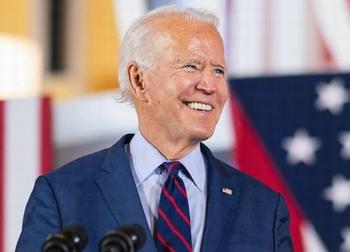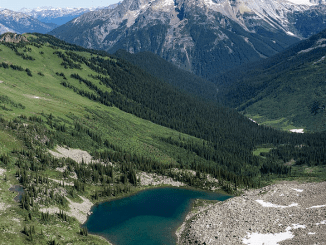
WASHINGTON, DC, January 19, 2021 (ENS) – President-elect Joe Biden has a busy day planned for Inauguration Day Wednesday, January 20. A series of executive orders expected from President Biden on his first day in office include many that affect the environment, particularly the climate.
Among his actions on Day One, Biden intends to sign an executive order to rescind the construction permit for the controversial Keystone XL pipeline expansion granted in 2019 by President Donald Trump.

In other environmental decisions, President Biden also is expected to rejoin the Paris Climate Agreement, announce a date for a U.S.-hosted Leaders’ Climate Summit, reimpose methane-emission regulations on oil and gas operations, require government buildings shift towards clean energy, and block new oil drilling permits leased earlier this month in the Arctic National Wildlife Refuge.
The Keystone Pipeline is an oil pipeline system in Canada and the United States, commissioned in 2010 and owned by Calgary-based TC Energy, formerly TransCanada Corporation, and the Government of Alberta.
It runs from the Canadian tar sands in northern Alberta to refineries in Illinois and Texas, and also to oil tank farms and an oil pipeline distribution center in Cushing, Oklahoma.
It was 15 years ago, on February 9, 2005, that TransCanada Corporation first proposed the Keystone Pipeline project. The Keystone XL extension was proposed in June 2008.
Climate Defenders Object to Burning Thick, Tarry Alberta Crude
The pipeline hit the headlines when the planned fourth phase, Keystone XL, drew opposition from environmentalists and Indigenous peoples, becoming a symbol of the battle over climate change and fossil fuels.
Keystone XL would carry up to 830,000 additional barrels a day of diluted bitumen from Alberta’s oil sands to refineries along the U.S. Gulf Coast.
The Keystone XL extension would connect the Phase I-pipeline terminals in Hardisty, Alberta, and Steele City, Nebraska. It would run through Baker, Montana, where American-produced light crude oil from Montana and North Dakota would be added to the Keystone’s throughput of synthetic crude oil and diluted bitumen from the oil sands of Canada.

On January 29, 2015, The U.S. Senate approved the construction of the Keystone XL Pipeline. The House of Representatives voted to approve it on February 11, 2015
But less than a month later, then-President Barack Obama rejected the Keystone XL construction permit over environmental concerns and for fear it would worsen climate change.
On January 24, 2017, four days after he took office, President Donald Trump acted to permit the pipeline’s completion.
On January 17, 2021, it was announced that President-elect Joe Biden planned to cancel the Keystone XL project during his first days in office.
Environmental concerns include the potential for air pollution, and for leaks and spills, that could pollute critical water supplies and cause harm to migratory birds and other wildlife. A major concern was the way in which the original route crossed the Sandhills, the large wetland ecosystem in Nebraska, and the Ogallala Aquifer, one of the largest reserves of fresh water in the world.
Since 2010, there have been concerns that a pipeline spill could threaten the Ogallala Aquifer, which spans eight states, provides drinking water for two million people and supports $20 billion in agriculture. Critics say that a major leak could ruin drinking water and devastate the U.S. economy across the Midwest.
Canada Pressures USA to Allow Keystone XL to Proceed
But Kirsten Hillman, Canada’s ambassador to the United States, has argued for months that the project is not the same one President Barack Obama rejected in 2015. “Not only has the project itself changed significantly since it was first proposed, but Canada’s oilsands production has also changed significantly,” Hillman told the Canadian Press.
“Per-barrel oilsands greenhouse gas emissions have dropped 31 percent since 2000, and innovation will continue to drive progress,” said Hillman, pointing out that the Canadian Government has also strengthened its climate plan in an effort to exceed the current target for cutting greenhouse gases by 2030, and to reach net-zero emissions by 2050.
On July 6, 2020, the U.S. Supreme Court rejected a request by the Trump administration to allow construction of the long-delayed Keystone XL oil pipeline, which would carry crude from Canada to Nebraska and has faced challenges by environmentalists for nearly a decade.
And today, author and activist Bill McKibben, a distinguished scholar at Vermont’s Middlebury College and leader of the climate campaign group 350.org, who has opposed the Keystone XL pipeline from the first, tweeted, “Looking forward to the day when we never have to say the phrase ‘Keystone XL’ again, except to remember so many people fighting so hard for so long in a battle that fundamentally changed the trajectory of the climate battle.”
Cancellation Would Hurt the U.S.-Canada Relationship
North of the border, Alberta Premier Jason Kenney reacted with dismay on reports Presiden Biden may cancel the Keystone XL pipeline permit. “Doing so would kill jobs on both sides of the border, weaken the critically important Canada-U.S. relationship, and undermine U.S. national security by making the United States more dependent on OPEC oil imports in the future,” the premier said.
For Canada, the Keystone XL pipeline appeared to be a resolution of the province’s decades-long struggle to obtain the pipeline capacity to ship its plentiful crude oil to the U.S. Gulf Coast and other overseas markets.

The cancelation of Keystone XL would cost Alberta taxpayers just over C$1 billion (US$785 million), Kenney said.
In March, Kenney’s government agreed to fund the first year of construction with a C$1.1 billion investment and to guarantee C$4.2 billion worth of loans as a way to jump-start construction.
Now Kenney is saying that the province of Alberta and TC Energy have a “solid legal basis” to recoup damages through the courts.
Since Alberta construction of the Keystone XL pipeline began in July 2020, more than 90 kilometers (60 miles) of pipe have been strung along its right-away near Oyen.
Premier Kenney pointed out, “The Keystone XL pipeline also represents tens of thousands of good-paying jobs that the American economy needs right now. That is why major American labor unions who supported President-elect Biden’s campaign strongly back the project, as do First Nations who have signed partnership agreements, and all state governments along the pipeline route.”
But not all First Nations, as Indigenous Canadian Tribes are known, support the Keystone XL pipeline. The Lakota People’s Law Project says on its website, “Let’s end this pipeline and keep the world’s dirtiest oil in the ground. Together, we can eliminate threats to climate, tribal sovereignty, and the safety of Indigenous women and girls.”
The Lakota are circulating a petition that will go to President Biden calling for the blockage of two pipelines – Keystone XL and the Dakota Access Pipeline, a 1,172-mile-long (1,886 km) underground oil pipeline in the United States. It begins in the shale oil fields of the Bakken formation in northwest North Dakota and continues through South Dakota and Iowa to an oil terminal near Patoka, Illinois.
The petition says in part, “Protect the planet and the Lakota people. No man-camps. No destruction of the earth. No endangering our water. Mni wiconi — water is life.”
TC Energy plans to establish a half dozen man-camps across Montana, South Dakota and Nebraska to provide temporary housing and facilities for workers outside of small, rural enclaves, the Lakota People warn. They say that especially during the coronavirus pandemic, man-camps remind them of the smallpox-infected blankets that were deliberately distributed to Indigenous people, who then died of smallpox.
The Brave Heart Society, an Indigenous rights group, said, “The threat of the man-camps to our native women stands, and we will remain vigilant. We send this strong message to the investors of the Keystone XL Pipeline, reiterating that you are endangering our families now with a twin threat – to our women, and now our health through an uncontrolled virus. Not to mention, it also jeopardizes the health of your own workers.”
Nevertheless, since May, Canadian officials have been advocating for a cross-border discussion on climate and energy that would make room for both building the project and reducing emissions. On January 18, 2018, TransCanada announced they had secured commitments to ship 500,000 barrels a day from the Alberta tar sands for 20 years
Premier Kenney explained, “As the Government of Canada has said, building Keystone XL is ‘top of the agenda’ with the incoming Biden administration. Prime Minister [Justin] Trudeau raised the issue with President-elect Biden on their November 9, 2020, telephone meeting, agreeing to engage on key issues, including … energy cooperation such as Keystone XL.”
“As President-elect Biden’s green jobs plan acknowledges, Americans will consume millions of barrels of oil per day for years to come,” the premier said. “It is in perfect keeping with his plan that the United States energy needs should be met by a country that takes the challenges of climate change seriously.”
Copyright Environment News Service (ENS) 2021. All rights reserved.
© 2021, Environment News Service. All rights reserved. Content may be quoted only with proper attribution and a direct link to the original article. Full reproduction is prohibited.



